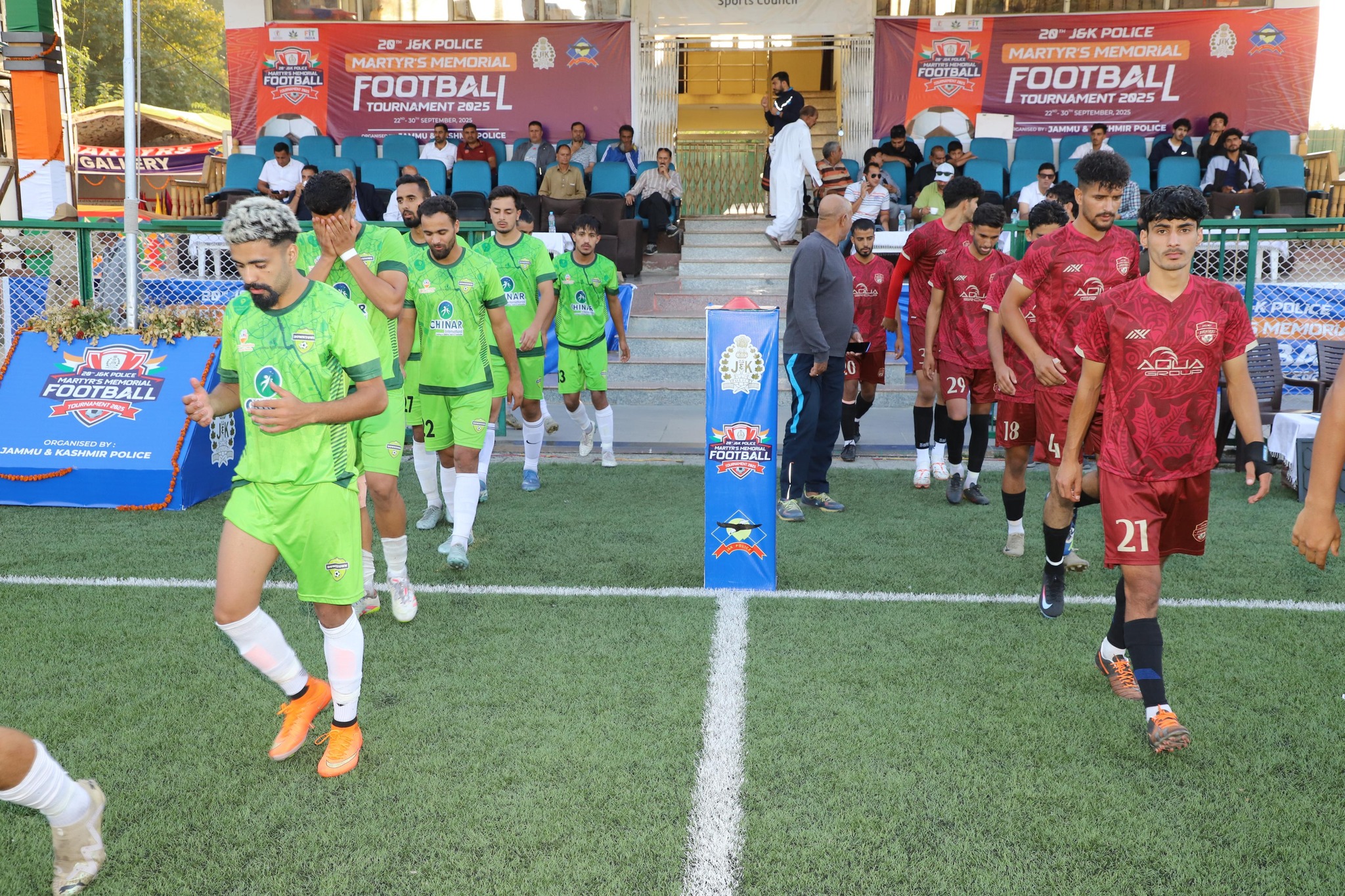A Celebration That Turned Controversial
By: Javid Amin | 30 September 2025
On September 30, 2025, Srinagar’s TRC Ground was alive with excitement. The final match of the 20th J&K Police Martyr’s Memorial Football Tournament was about to kick off, drawing crowds of sports enthusiasts, families, and dignitaries, including Lieutenant Governor Manoj Sinha.
What was supposed to be a unifying celebration of sports and a tribute to martyrs, however, ended in controversy. Just moments before the final whistle of the opening ceremony, 15 spectators were detained for allegedly failing to stand during the Indian National Anthem.
The incident, carried out by police officials from Kothibagh Police Station, has ignited heated discussions about patriotism, civil liberties, and the legal enforcement of national symbols in public spaces.
What Exactly Happened at TRC Ground?
-
As per the protocol, a live police band began playing the Indian National Anthem before the final match.
-
While most of the spectators and dignitaries stood in respect, police officers noticed a group of around 15 individuals seated in the stands.
-
These individuals were detained immediately under the suspicion of deliberately refusing to honor the anthem.
-
Police invoked provisions of the Prevention of Insults to National Honour Act, 1971, which criminalizes any act of disrespect to the National Anthem, Flag, or Constitution.
For many in the audience, the detentions came as a shock. A joyous occasion meant to honor the sacrifices of police martyrs suddenly transformed into a tense legal episode.
Family Reactions: Misunderstanding or Disrespect?
Relatives of those detained strongly defended them, insisting that:
-
The anthem was played at a very low volume, making it difficult to identify immediately.
-
Some spectators were unaware that the anthem had begun due to background noise in the stadium.
-
No intentional disrespect was meant toward the national symbol.
One family member told local reporters:
“This was not about disrespect. Many people simply didn’t realize the anthem was being played. How can you punish someone for not reacting to something they couldn’t hear properly?”
This defense highlights the fine line between protocol enforcement and human error.
The Legal Context: The Prevention of Insults to National Honour Act, 1971
To understand the gravity of the incident, one must look at the legal framework.
-
The Prevention of Insults to National Honour Act, 1971 makes it a punishable offense to intentionally insult the Indian National Anthem, Flag, or Constitution.
-
Penalties can include up to three years imprisonment, a fine, or both.
-
Courts have previously ruled that intentional disrespect must be proven beyond doubt for conviction.
In this case, proving intentional insult vs. unintentional mistake will likely be at the heart of any legal proceedings.
Political Reactions: LG Manoj Sinha’s Stance
Lieutenant Governor Manoj Sinha, who was present at the event, addressed the matter later in a press briefing.
He stated:
“Respecting the National Anthem is a duty of every citizen. However, authorities must ensure that enforcement is carried out with fairness and clarity. Patriotism should unite, not divide.”
His statement attempted to balance the need for respect with the rights of individuals, but the controversy has already sparked heated debates across Kashmir and India.
Patriotism vs. Civil Liberties: The Larger Debate
This incident raises several critical questions:
-
What defines patriotism? Is it symbolic gestures like standing during the anthem, or is it deeper contributions to society?
-
Where does enforcement end and personal freedom begin?
-
Can genuine misunderstandings be punished under strict legal frameworks?
-
Do such actions strengthen unity or breed resentment?
In Kashmir, where politics and identity are deeply sensitive, such incidents can take on added layers of meaning, often beyond the immediate act.
Sports, Symbolism, and Sensitivities in Kashmir
The J&K Police Martyr’s Memorial Football Tournament has long been a symbol of resilience, remembrance, and unity. For 20 years, it has honored police personnel who sacrificed their lives in the line of duty.
Yet, the anthem incident overshadowed the very spirit of unity and respect the tournament aimed to promote.
Sports are often seen as a bridge that connects communities, but when national symbolism collides with local sensitivities, even a football match can become a flashpoint.
Expert Opinions: Law, Rights, and Respect
Legal experts, civil society voices, and political analysts have weighed in:
-
Legal Experts: Stress the need to prove intent. Mistakes cannot automatically be equated with disrespect.
-
Civil Rights Activists: Warn that heavy-handed enforcement risks alienating citizens and curbing freedoms.
-
Political Commentators: Suggest that the issue could polarize debates further, especially in sensitive regions like Kashmir.
One constitutional scholar remarked:
“Respect for the national anthem should come from the heart, not fear of punishment. Otherwise, we risk reducing patriotism to a forced ritual.”
Public Reactions: Voices on Social Media
The incident has gone viral across social platforms, trending under hashtags like #NationalAnthemRow, #SrinagarFootball, and #PatriotismDebate.
-
Some users condemned the detainees, arguing that failing to stand is a clear act of disrespect.
-
Others defended them, pointing to poor audio arrangements and questioning the fairness of immediate detentions.
This reflects the polarization of public opinion in India on issues of nationalism and freedom of expression.
A Historical Perspective: National Anthem Controversies in India
This is not the first time India has witnessed controversies around the anthem.
-
In 2016, the Supreme Court mandated the playing of the anthem in cinema halls, sparking nationwide debates.
-
In 2018, the order was modified, making anthem playing optional after criticism of over-enforcement.
-
Several past cases have also dealt with whether sitting, refusing, or remaining silent during the anthem constitutes disrespect.
The Srinagar incident now adds another chapter to this ongoing debate in India’s democratic journey.
The Way Forward: Lessons to Learn
This incident underscores the importance of:
-
Clear communication during public events – Proper sound systems, announcements, and instructions should prevent confusion.
-
Distinguishing intent from accident – Legal authorities must carefully assess cases before applying punitive laws.
-
Encouraging respect through education – Patriotism is best nurtured through awareness, not fear.
-
Balancing protocol with civil liberties – Respect for national symbols should not come at the cost of democratic freedoms.
Bottom-Line: Beyond One Incident
The 20th J&K Police Martyr’s Memorial Football Tournament was meant to honor sacrifice and celebrate sport. Yet, the detention of 15 spectators for allegedly not standing during the anthem turned it into a national debate.
Whether it was a case of genuine misunderstanding or willful defiance, the incident reveals the complex intersection of patriotism, law, and civil rights in India today.
As the legal process unfolds, one hopes that sensitivity, fairness, and perspective will guide decision-making, ensuring that the spirit of respect is not lost in the heat of enforcement.


